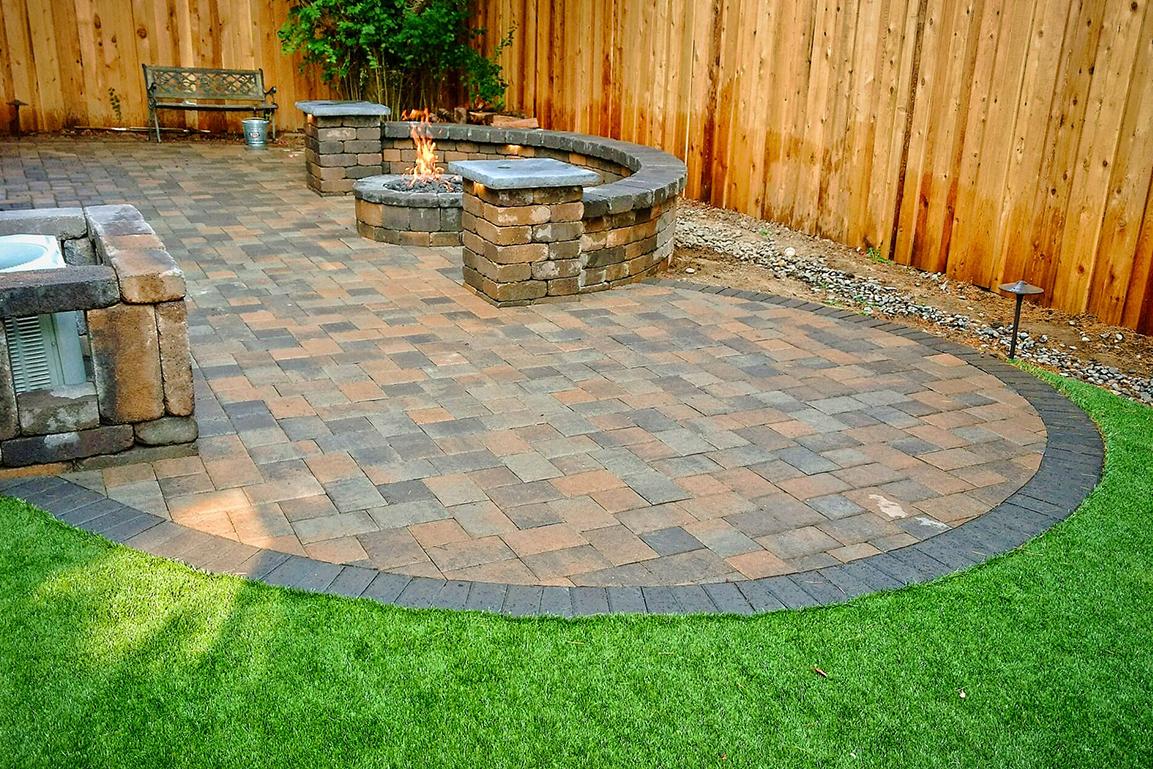Blog

The Ultimate Guide to Pavers: Types, Benefits, and Installation Tips for Your Hardscaping Project
What are Pavers?
Pavers are flat, usually rectangular pieces used in outdoor hardscaping to create durable and aesthetically pleasing surfaces. Made from various materials, pavers can be used for driveways, patios, walkways, and more, adding structure and beauty to outdoor spaces.
Importance of Pavers in Hardscaping
In hardscaping, pavers play a crucial role by providing both functional and decorative elements. They offer a solid, stable surface while enhancing the visual appeal of the landscape. Whether for a cozy backyard patio or a grand driveway, pavers bring both practicality and charm.
Types of Pavers
Concrete Pavers
Concrete pavers are versatile and affordable. They come in various shapes, sizes, and colors, making them a popular choice for many homeowners.
Brick Pavers
Brick pavers provide a classic, timeless look. Known for their strength and durability, they are often used in walkways and driveways.
Stone Pavers
Stone pavers, made from natural stone like granite, limestone, or slate, offer a high-end, elegant look. They are highly durable but can be more expensive.
Rubber Pavers
Rubber pavers are made from recycled materials and are an eco-friendly option. They are softer underfoot, making them great for play areas and paths.
Benefits of Using Pavers
Durability and Longevity
Pavers are built to withstand heavy loads and harsh weather conditions, ensuring a long-lasting solution for outdoor spaces.
Aesthetic Appeal
With a wide range of styles and colors, pavers can enhance the beauty of any landscape, offering endless design possibilities.
Versatility in Design
Pavers can be arranged in various patterns and layouts, allowing for creative and customized designs that fit any aesthetic preference.
Low Maintenance
Once installed, pavers require minimal maintenance. Regular cleaning and occasional sealing keep them looking new for years.
Eco-Friendly Options
Many pavers are made from sustainable materials or recycled content, making them an environmentally friendly choice.
Popular Uses for Pavers
Driveways
Pavers provide a durable and attractive surface for driveways, capable of handling heavy vehicle traffic.
Patios
Create an inviting outdoor living space with paver patios, perfect for dining, entertaining, or relaxing.
Walkways
Paver walkways guide visitors through your garden or yard, adding structure and visual interest.
Pool Decks
Pavers around the pool offer a non-slip surface that stays cool underfoot, combining safety with style.
Garden Pathways
Enhance your garden with paver pathways, adding charm and easy navigation through your outdoor oasis.
Choosing the Right Pavers for Your Project
Assessing Your Needs
Consider the purpose and location of your project to choose pavers that meet your specific needs.
Considering the Climate
Select pavers that can withstand the local climate, from freezing winters to hot summers, to ensure longevity.
Matching Your Home’s Style
Choose pavers that complement the architectural style and color palette of your home for a cohesive look.
Budget Considerations
Balance your desired aesthetic with your budget, keeping in mind both material and installation costs.
Installation Process
Planning and Design
Start with a detailed plan, including measurements, layout, and design choices to ensure a successful project.
Site Preparation
Properly preparing the site, including excavation and leveling, is crucial for a stable and long-lasting installation.
Laying the Pavers
Install the pavers according to your design, ensuring even spacing and alignment for a professional finish.
Sealing and Finishing
Apply a sealant to protect the pavers and enhance their appearance, and add finishing touches like edging or lighting.
Maintenance Tips for Pavers
Regular Cleaning
Keep your pavers clean by sweeping and hosing down regularly to prevent dirt and debris buildup.
Sealing Pavers
Seal your pavers every few years to protect against stains, weathering, and color fading.
Weed and Moss Control
Use appropriate weed control methods to prevent weeds and moss from growing between the pavers.
Repairing and Replacing Pavers
Replace any damaged pavers promptly to maintain the integrity and appearance of your hardscape.
Common Mistakes to Avoid
Poor Planning
Skipping the planning phase can lead to issues with design and functionality. Take the time to plan thoroughly.
Skipping the Base Preparation
A solid base is essential for preventing shifting and settling. Don’t cut corners on base preparation.
Not Allowing for Proper Drainage
Ensure proper drainage to avoid water pooling and potential damage to your pavers.
Neglecting Maintenance
Regular maintenance is key to keeping your pavers in top condition. Don’t overlook this important step.
Eco-Friendly Paving Solutions
Permeable Pavers
Permeable pavers allow water to pass through, reducing runoff and promoting groundwater recharge.
Recycled Materials
Opt for pavers made from recycled materials to minimize environmental impact.
Sustainable Practices
Choose manufacturers that follow sustainable practices and use eco-friendly materials.
Cost Considerations
Material Costs
The cost of pavers varies depending on the material, with options ranging from budget-friendly to high-end.
Installation Costs
Factor in the cost of professional installation or the time and effort for a DIY project.
Maintenance Costs
Consider the long-term maintenance costs, including cleaning, sealing, and repairs.
Hiring a Professional vs. DIY
Pros and Cons of Hiring a Professional
Professionals offer expertise and efficiency but come at a higher cost. Evaluate your budget and project complexity.
Pros and Cons of DIY
DIY can save money but requires time, effort, and skill. Assess your ability to complete the project successfully.
Finding a Reliable Contractor
Research and vet contractors thoroughly to ensure you hire a reputable professional for your project.
Trends in Paver Designs
Contemporary Styles
Modern designs with clean lines and minimalist aesthetics are trending in hardscaping.
Traditional Designs
Classic patterns and materials remain popular for their timeless appeal.
Innovative Patterns and Textures
Experiment with unique patterns and textures to create a distinctive look for your outdoor space.
Color Trends
Neutral tones and earthy colors are in demand, offering a natural and elegant appearance.
Enhancing Your Outdoor Space with Pavers
Combining Pavers with Other Hardscaping Elements
Integrate pavers with elements like retaining walls, fire pits, and outdoor kitchens for a cohesive design.
Integrating Landscaping and Greenery
Blend pavers with plants, trees, and shrubs to create a harmonious outdoor environment.
Lighting and Accessories
Add lighting and accessories to highlight your pavers and enhance the ambiance of your outdoor space.
Conclusion
Pavers are a versatile, durable, and attractive choice for various hardscaping projects. With proper planning, installation, and maintenance, they can enhance the beauty and functionality of your outdoor space. Whether you choose to hire a professional or tackle a DIY project, pavers offer endless possibilities to transform your landscape.
FAQs
How long do pavers last? Pavers can last for decades with proper installation and maintenance, often 20-30 years or more.
Can pavers be installed over existing concrete? Yes, pavers can be installed over existing concrete, but proper preparation and a suitable base are essential.
What is the best way to clean pavers? Regular sweeping and hosing down with water is usually sufficient. For stubborn stains, a mild detergent or specialized paver cleaner can be used.
Do pavers need to be sealed? Sealing pavers helps protect against stains, weathering, and color fading. It’s recommended to seal pavers every few years.
How do I prevent weeds from growing between pavers? Using polymeric sand between the pavers and applying a weed control product can help prevent weed growth. Regular maintenance is also crucial.
Transform Your Yard with Expert Care
We take pride in delivering exceptional hardscaping
services for a healthy and vibrant yard.
Frequently Asked Questions
What is hardscaping and how does it differ from landscaping?
Hardscaping refers to the non-living elements of your outdoor space, including patios, walkways, retaining walls, and outdoor kitchens, made from hard materials like stone, brick, and concrete. Landscaping encompasses the living, horticultural elements such as plants, trees, and lawns.
How long does a typical hardscaping project take to complete?
The duration of a hardscaping project can vary significantly based on its scope, complexity, and the materials used. Smaller projects might take a few days, while larger, more intricate designs can take several weeks. We'll provide a more accurate timeline after discussing your specific needs and reviewing your project's details.
Do I need to obtain any permits for my hardscaping project?
Depending on the nature and location of your project, permits may be required. Our team will assess the need for permits during the initial consultation and handle the application process for you if necessary.
Can hardscaping improve my property value?
Yes, high-quality hardscaping can significantly enhance your property's curb appeal and increase its overall value. Well-designed outdoor spaces are highly sought after and can be a compelling feature if you decide to sell your home.
How should I maintain my new hardscape to ensure its longevity?
Maintenance requirements vary by material, but generally, we recommend regular cleaning and sealing of pavers and stone to protect against weathering and stains. We will provide you with specific care instructions tailored to your project's materials upon completion.
Can hardscaping solutions be eco-friendly?
Absolutely. We offer a variety of eco-friendly hardscaping options, including permeable pavers that allow for water infiltration and reduce runoff, and the use of recycled or locally sourced materials. Our team is committed to sustainable practices that benefit both our clients and the environment.
